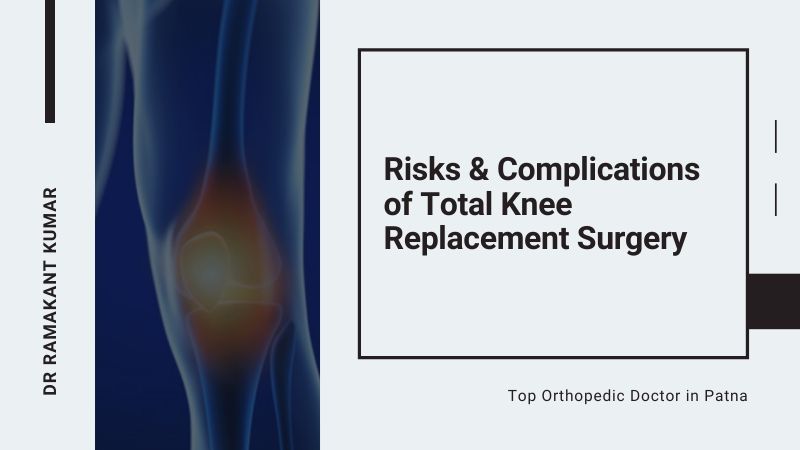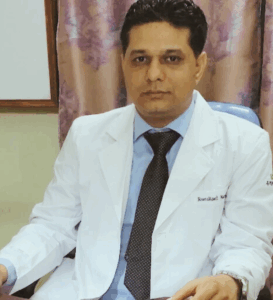Read this blog to know about the possible Risks and Complications of Total Knee Replacement Surgery. Also know about Dr. Ramakant Kumar, Best doctor for Total Knee Replacement in Patna……..
A Total Knee Replacement is a surgical procedure whereby the diseased knee joint is replaced with an artificial material.
The procedure involves cutting away damaged bone and cartilage from your thighbone, shinbone and kneecap and replacing it with an artificial joint (prosthesis) made of metal alloys, high-grade plastics and polymers.
Therefore, the need for such complicated surgery must be assessed by a professional orthopedic surgeon like Dr. Ramakant Kumar, Best Doctor for Knee Joint Replacement in Patna.
This is because he has performed numerous Knee Replacement Surgery in Patna with exceptionally low rate of complications and high patient satisfaction score.
Let’s move to the next section that deals with Risks and Complications of Total Knee Replacement Surgery.
Contents
Possible Risks and Complications of Total Knee Replacement Surgery
Total knee replacement is a standard procedure that thousands of people undergo every year and generally many of them have no complications.
However, it is essential to know what the risks are and how to spot the signs of a complications. As this will help the person to make an informed decision about whether to go ahead with it or not. It will also equip one to take action if a problem does arise.
Following mentioned are some of the Post Knee Replacement Problems and Complications after Knee Replacement Surgery:
Complications from Anesthesia
A surgeon may use general or local anesthesia during the surgery. It is usually safe, but can have adverse side effects.
The most common side effects of Anesthesia include:
- Vomiting
- Dizziness
- Shivering
- Sore throat
- Aches and pains
- Discomfort
- Drowsiness
- Breathing difficulties
- Allergic reaction
Blood Clots
There is a high risk of developing a blood clot after the surgery such as Deep Vein Thrombosis (DVT). If a clot travels through the bloodstream and causes a blockage in the lungs, then a pulmonary embolism (PE) may result. This may also results in Internal Bleeding after Knee Replacement Surgery which can be life-threatening.
Blood clots can occur either during or after the surgery, but they are more common after orthopedic surgeries like knee replacements.
Symptoms usually appear within 2 weeks of the surgery, but clots can form within a few hours or even during the procedure. These blood clots generally results in redness, swelling, pain and warmth.
Total Knee Replacement Complications Stiffness
Knee Replacement Problems Stiffness and Knee Replacement Complications Swelling are most common complications after a knee replacement surgery. Scar tissue or other complications can sometimes affect motion of the knee. However, doing special exercises or physical therapy can help resolve this.
But, if there is severe stiffness, the person may need a follow-up procedure to break up the scar tissue or adjust the prosthesis inside the knee.
If there is no additional problems, then ways of preventing stiffness include getting regular exercise and telling the doctor if stiffness does not reduce in time.
Wearing out of implants
Sometimes, there may be a problem with the implant. Some of the problems include:
- The knee may not bend properly
- The implant might become loose or unstable over time
- Parts of the implant may break or wear out
However, according to the analysis done by the studies, only 0.7 percent people experience mechanical complications during their hospital stay, but problems can still arise during the weeks after the surgery.
If these problems occur, the person may need a follow-up procedure, or revision, to fix the problem.
Infections
Infections are generally rare after knee replacement surgery, but they can occur. Infection is a severe complication, and it needs immediate medical attention. According to studies, about 1.8 percent people reported an infection within 90 days of the surgery.
Infection can occur if bacteria enter the knee joint or after the surgery. Some of the ways of preventing infections include:
- Taking any antibiotics the doctor prescribes
- Following all instructions about keeping the wound clean
- Contacting the doctor if there are signs of infection, such as redness, soreness, or swelling that get worse rather than better
- Making sure the doctor knows about any other health conditions you may have or medications you are taking
Some people are more prone to infections as their immune system is compromised by a medical condition or the use of certain medications. This includes people with diabetes, HIV, those who use immune-suppressant medications, and those who take medication following a transplant.
Persistent Pain
It is usually normal to have some pain after surgery, but this pain generally improves with time. However, doctors can provide some pain relief until this happens.
In rare cases, pain may persist longer. Therefore, people who have ongoing or worsening pain should seek advice from their doctor, as there may be a complication.
The most common complication is that people don’t like the way their knee works or they continue to have pain or stiffness.
Knee Replacement Complications Nerve Damage
The major arteries of the leg are directly behind the knee. For this reason, there’s a very small chance of damage to these vessels.
In addition to that, up to 10 percent of people may experience nerve damage during the surgery. One may experience the following symptoms if this happens:
- Numbness
- Foot drop
- Weakness
- Tingling
- A burning or prickling sensation
Thus, if you notice these symptoms, contact your doctor. Treatment will depend on the extent of the damage.
Dr. Ramakant Kumar – Best Doctor for Knee Joint Replacement in Patna
Being the Best Doctor for Total Knee Replacement in Patna, Dr. Ramakant Kumar is specialized in performing various Knee-related surgeries. He has also successfully introduced and integrated new advancements in the treatment of Knee surgeries.
In addition to that, he has done many international fellowships in minimally invasive Joint Replacement Surgeries and Knee Arthroscopy. His clinic Quality Ratings are also excellent amongst the others Orthopaedic Surgery Specialists in Patna.
Being the Best doctor for Full Knee Replacement in Patna, he specializes in performing surgeries for both Bilateral Knee Replacement in Patna and Robotic Knee Replacement in Patna.
Additionally, his clinic quality ratings are also excellent amongst other doctors for Knee Surgery Patna.
So, if you are residing near Boring Road and looking for Best Knee Replacement Doctor Patna, then you must consult Dr. Ramakant Kumar
We hope that you find this blog of Risks and Complications of Total Knee Replacement Surgery informative……………
Till then, Stay Tuned, as we will be back with more such informative blogs……….




